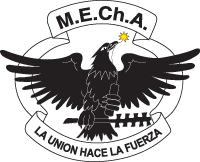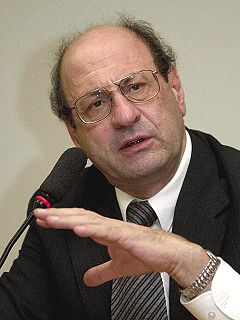Related Research Articles

M.E.Ch.A. is a US-based organization that seeks to promote Chicano unity and empowerment through political action. The acronym of the organization's name is the Chicano word mecha, which is the Chicano pronunciation of the English word match and therefore symbolic of a fire or spark; mecha in Spanish means fuse or wick. The motto of MEChA is 'La Union Hace La Fuerza'.

Stavros Lambrinidis is a Greek lawyer and politician who has served as the Ambassador of the European Union to the United States since March 2019. He previously served as the European Union Special Representative for Human Rights from 2012 to 2019 and Minister for Foreign Affairs from June 2011 to November 2011.
Mireille Roccatti Velásquez, is a Mexican scholar and jurist who served as the first female president of the country's National Human Rights Commission.

The University of Monterrey is a private Catholic-inspired educational institution, open to all creeds and conditions, founded in 1969. The UDEM Campus is located in the municipality of San Pedro Garza García, belonging to the Metropolitan Area of Monterrey, Nuevo León, Mexico.
The Global Fund for Women is a non-profit foundation funding women's human rights initiatives. It was founded in 1987 by New Zealander Anne Firth Murray, and co-founded by Frances Kissling and Laura Lederer to fund women's initiatives around the world. It is headquartered in San Francisco, California. Since 1988, the foundation has awarded over $100 million in grants to over 4,000 organizations supporting progressive women's rights in over 170 countries. Ms. Magazine has called the Global Fund for Women "one of the leading global feminist funds."
The Moroccan Association for Human Rights, is one of the biggest Moroccan human rights non-governmental organizations. It was founded on June 24, 1979, in Rabat to work for the preservation of human dignity and the respect, protection, defense and promotion of human rights in Morocco and Western Sahara. It uses different means to achieve its objectives such as the publication of a monthly newspaper, sit-ins and the holding of conferences. The AMDH considers equally crucial building partnerships with internal and external organizations and networks in order to be stronger in the fight for human rights.
AMDH may refer to:
Association Mauritanienne des Droits de l'Homme(AMDH) is a Mauritanian non-profit human rights non-governmental organization founded in 1991 Mauritania. It is based in Nouakchott. As of 2006, its president is Fatimata Mbaye.
The UNESCO/Bilbao Prize for the Promotion of a Culture of Human Rights, created in 1978 as the UNESCO Prize for Human Rights Education to mark the 30th anniversary of the adoption of the Universal Declaration of Human Rights, serves to honour the efforts of organizations or individuals that have made an exemplary contribution to the advancement of knowledge on human rights and building a universal culture of human rights. It was renamed on 5 May 2008 under the terms of a memorandum of understanding with Mayor of Bilbao Iñaki Azkuna whereby the municipality of Bilbao agreed to fund the prize for a period of three years.

José "Pepe" Zalaquett Daher was a Chilean lawyer, renowned for his work in the defence of human rights during the de facto regime that governed Chile under General Augusto Pinochet from 1973 to 1990.
MEDICC is a non-profit organization founded in 1997 that works to enhance cooperation among the US, Cuban and global health communities through its programs.
The Permanent Assembly for Human Rights is an Argentine non-governmental human rights organization; founded in 1975. According to its official website the organization is the product of a "call from people coming from distinct areas: the church, politics, Human Rights, sciences, culture, and labour Argentinians in response to the increasing violence and the collapse of the most elemental Human Rights in the country".
Gabriel Fino Noriega was a Honduran journalist and radio presenter who presented a daily news show on Radio Estelar. He also worked for Radio America (Honduras). He was shot dead on July 3, 2009 in San Juan Pueblo, near La Ceiba in the early days of the 2009 Honduran constitutional crisis. Noriega was in favour of a constituent assembly and opposed to the 2009 coup d'état. Local human rights organisation COFADEH attributed the assassination to the coup d'état, while an international human rights mission judged this claim to be a useful line of research.

Women in Paraguay is a group of women whose rights are challenged in the country of Paraguay. Faced by socioeconomic inequalities and gender pay gap, they experienced significant cultural changes since 1990 as a result of constitutional and legal expansions of women's rights and evolving cultural attitudes. The legal and government institutions currently existing in Paraguay were developed in part through the efforts of feminist organizations in the country that held significant awareness-raising campaigns during the 1990s to formalize the guarantees of women's rights. UN Women supports the Paraguayan State in the challenge to extend women's rights, to fight for gender equality, as well as women's empowerment. It also ensures that women's voices are heard and create more opportunities for women.

Jaime Aparicio Otero is the Bolivian Permanent Representative to the Organization of American States and Bolivian Agent to the International Court of Justice, in the Hague, in the process against Chile related to the Silala waters. Ambassador Aparicio is a career diplomat, lawyer, journalist and a Washington-based legal and political advisor. He was also a political analyst working in international public and corporate affairs in Latin America, the Caribbean, North America, and Europe. He has a Law Degree from the Higher University of San Andrés of La Paz, the Bolivian Diplomatic Academy and the Institute d’Etudes Politiques commonly referred as Sciences Po de Paris.

Mauro Cabral Grinspan, also known as Mauro Cabral, is an Argentinian intersex and trans activist, who serves as the executive director of GATE. A signatory of the Yogyakarta Principles, his work focuses on the reform of medical protocols and law reform. In July 2015, Cabral received the inaugural Bob Hepple Equality Award.
Gloria Angélica Careaga Pérez is a Mexican social psychologist and feminist. She has taught at the Faculty of Psychology in the National Autonomous University of Mexico since 1979. She is co-founder of Mexican organization El Closet de Sor Juana and former co-Secretary General of the International Lesbian, Gay, Bisexual, Trans and Intersex Association.
Consuelo Gloria Morales Elizondo is a Mexican human rights activist, founder and director of the organization Ciudadanos en Apoyo a los Derechos Humanos, A.C. (CADHAC), known in English as Citizens in Support of Human Rights.

In Mexico there are no explicit rights reserved to intersex persons, no protections from non-consensual cosmetic medical interventions on intersex children and no legislative protection from discrimination. Intersex persons may have difficulties in obtaining necessary health care.

The Movimiento Judío por los Derechos Humanos was a human rights organization in Argentina. It was founded by Marshall Meyer and Herman Schiller on August 19, 1983.
References
- ↑ "Archived copy". Archived from the original on 2011-10-13. Retrieved 2011-12-08.
{{cite web}}: CS1 maint: archived copy as title (link) - ↑ http://guiaqesq.cencos.org/index.php?option=com_content&view=article&id=68:academia-mexicana-de-derechos-humanos-ac-amdh%5B%5D
- ↑ "Archived copy". Archived from the original on 2012-05-01. Retrieved 2011-12-08.
{{cite web}}: CS1 maint: archived copy as title (link) - ↑ Ritzer, George, ed. (2007-02-15). The Blackwell Encyclopedia of Sociology. Oxford, UK: John Wiley & Sons, Ltd. doi:10.1002/9781405165518. ISBN 9781405124331.
- ↑ "Archived copy". Archived from the original on 2012-04-06. Retrieved 2011-12-08.
{{cite web}}: CS1 maint: archived copy as title (link) - ↑ "Archived copy". Archived from the original on 2004-05-05. Retrieved 2011-12-08.
{{cite web}}: CS1 maint: archived copy as title (link) - ↑ "Archived copy". Archived from the original on 2004-06-21. Retrieved 2011-12-08.
{{cite web}}: CS1 maint: archived copy as title (link) - ↑ "Archived copy" (PDF). Archived from the original (PDF) on 2012-04-05. Retrieved 2011-12-08.
{{cite web}}: CS1 maint: archived copy as title (link)